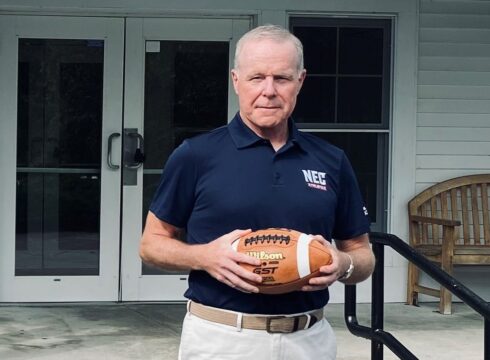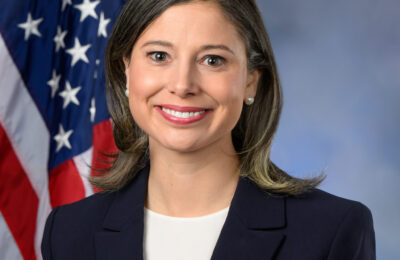Concord Monitor: “Ground Zero” to Goal Line: How One College Coach Built a Football Team from Scratch

By Abby DiSalvo, Concord Monitor
August 13, 2025; Updated August 14, 2025
Kevin Kelly’s father taught high school biology, and his mother taught second grade. The New England College football coach likes to tell people he went into the family business.
“Coaching is teaching,” he explains with a smile.
Kelly lectures to his players from an office that does little to reveal his decades of experience. The grey laptop on his meticulously-organized wooden desk bears a single NEC sticker. A poster propped against the back wall captures him in his playing days at Springfield College. A black-and-white photo shows his father, coaching from high school sidelines.
The walls hold few tributes to his 44 seasons of past coaching, but Kelly didn’t take the job at NEC to reminisce on the dozen different college whistles he has worn. The 65-year-old came to Henniker to do something new: build a football program entirely from scratch.
A long track
The sidelines of Brockport High School in Western New York gave a young Kelly his first coaching lesson. As a self-proclaimed “locker room brat,” he watched his father pace the gridiron and swore to follow in his footsteps.
After playing for three seasons at Springfield College, he took a job his senior year as the defensive coordinator at Longmeadow High School in Massachusetts. From there, he hopped to a coaching position at The Fieldston School, a private academy in the Bronx. Just two years later, Kelly wanted a taste of the next level. His winding career was about to take off.
“Bear with me,” Kelly warned before launching through the list. “It’s a long track.”
He got his foot in the collegiate door with a graduate assistantship at Southern Connecticut University. He took the same job at Syracuse after two seasons, then traveled with his old college coach up to Bowdoin for an assistant coaching position in 1988.
He jumped to Northeastern for two years before the entire staff got the boot, forcing Kelly to spend six months looking for work. He landed an assistant coaching job at Dartmouth, followed head coach Buddy Teevans to Tulane for three seasons, then returned to the Big Green in 1995.
When the opportunity to be the defensive coordinator at Marshall University popped up — at the same time Randy Moss donned the school’s trademark kelly green — Kelly took it. After helping the Bison to back-to-back MAC Championships and the team’s defense to a No. 23 national ranking, he stopped at Syracuse again for the 1999 season as an assistant coach.
He bounced back to Marshall for another MAC Championship, then onto the Naval Academy for a combined 26-11 three-year record. Kelly settled down at Georgetown as the head coach for the next eight years, raising program expectations while raising three kids at home with his wife, Kathy.
He turned the struggling Georgetown team around, and in 2011, the Hoyas put up their best season since 1999. Kelly earned Patriot League Coach of the Year honors. He stayed in Washington, D.C., until 2014, when he left to act as Ball State’s defensive coordinator.
After Ball State head coach Pete Lembo left, Kelly spent time at Wyoming Seminary Preparatory School and Bryant University. He went pro in 2019, taking a job as an XFL linebackers coach for the New York Guardians before the pandemic killed the season.
The well-traveled coach started to think about settling down near his three grandsons — “magnets,” as he refers to them. He chose a “semi-retirement” job at Salve Regina, in Rhode Island, to easily visit them in Cohasset, Mass.
By 2022, Kelly had coached professionals, high schoolers and every division of collegiate athlete. He was satisfied, and he thought he might be done.
The right coach, the right culture
Over at New England College, Wayne Lesperance Jr. had just kicked off his presidential tenure. Five months after stepping into the executive role, he felt the school lacked something: a football team.
Putting Pilgrims on the gridiron, Lesperance suspected, would do more than boost enrollment and generate revenue. It had the potential to benefit athletes and foster a deeper sense of campus community.
“I see football as a sport that, like many sports, can be very transformative for individuals who participate in it,” Lesperance said. “It teaches leadership. It teaches dedication. It promotes accountability, and so lots of values associated with the game, when you have the right coach and the right culture, can be a positive influence in the life of the students that are involved.”
He and the NEC administration conducted cost analyses and examined potential program returns. They guessed a football team could turn a profit within three years — if they found the right person to coach it.
Kelly, meanwhile, saw the job advertisement from his house in Rhode Island. It piqued his interest.
“That’s something I had never done before,” Kelly said. “So I threw my name in, and I didn’t know what to expect, starting football in the middle of New Hampshire.”
He spoke with Athletic Director Dave DeCew, and directly with Lesperance. He asked them questions about staffing, budget and facilities; they stacked him up against other interviewees.
“I knew what I wanted, and I wanted to make sure that my community here was confident,” Lesperance said. “What I heard from him, and what I heard from his references, was this commitment to character building, this commitment to really promoting accountability and making sure players were good human beings, good citizens on campus, as well as being good football players.”
Lesperance’s involvement only drew Kelly closer. He visited the grounds.
“Having support from the top, that really intrigued me,” Kelly said. “And there was a buzz on campus.”
Kelly took the job, and Lesperance got his coach.
They still faced a long road before their first game. When Kelly stopped by the administration building on his first day, they handed him a laptop and the best instructions they could: start football. He wasn’t phased.
“I had my eyes wide open walking in,” Kelly laughs, remembering the moment. “This position was different because it started from ground zero.”
A good beginning
Kelly settled into his office alone. Then he built a team around him.
He copied a student-driven staffing model from Springfield College, hiring four graduate assistants to help with recruiting and management. He drew upon his most recent experience at Salve Regina, a Division-III program, to plan the team’s operations. He got the patience from his years at Georgetown, remembering its transition to the Patriot League and early struggles with sub-par facilities.
All his experience recruiting at the Division I level, however, fell by the wayside. Kelly had no scholarships to offer, no program legacy to sell — just a vision, which he carefully curated.
“The biggest thing is convincing people that we’re going to get this thing off the ground, and that it’s going to be run correctly,” Kelly said. “It’s not just between the white lines. I call it the 44 program: the four years here, preparing for the next 40 years.”
Kelly developed four cornerstones for the NEC football program: academic success, professional development, football experience and an investment in education.
“I can’t always guarantee they’re going to start, be an All-American or those types of things,” he said. “But I can guarantee those four things that are going to happen in our football program.”
He built out his coaching staff, looking for diverse personalities that could connect with a variety of players. On the field, his XFL experience helped to develop training plans that worked for smaller rosters, with players servicing one another in practices.
The regimented scheduling of higher-division programs helped Kelly make the most of a compacted pre-season schedule in 2024. After arriving to campus just two weeks before the first game, players jammed as much training into each day as possible. That meant breakfast check-ins, team and position meetings, walk-throughs, practices, team dinners and more meetings — with just a three-hour break in the morning.
Kelly grew his roster to nearly 85 athletes by promising growth, commitment and experience. After preparing for a seven-game JV season on the road, the team turned in a 4-3 record.
“It was a good beginning,” Kelly said. “You have to build on that.”
The coach had no true veteran players to pass down the culture, so he found other ways to gel his team together between seasons. Kelly broke his athletes into six groups during the winter. The teams competed in point-based contests through spring, from class attendance and weight room competitions to donut-eating contests and community service. He also elected four team captains and met weekly with a team “leadership council” to get more serious feedback from players.
New England College fans, meanwhile, put immediate support behind Kelly. They tailgated at Plymouth State for the first pre-varsity game, with retired professors and alumni coming out to see the first snaps. The young program turned a profit before its junior varsity season could end, far surpassing the college’s initial projections.
“I was hopeful that I’d gotten the right guy,” Lesperance said. “But I went and saw a few practices. I went to several of the games last year, and I was absolutely convinced that we got the very best coach for NEC and for our students.”
Kelly still saw time on the clock. Even with his past experience — and success — he wanted to root NEC’s football team in the future.
Barometer of progress
This year, Kelly knows that his team will lose. He expects it.
“You’ve got to be patient. You’re building the program,” he says. “You’re not going to win a national championship your first year out.”
The ups and downs of any given season no longer phase the seasoned coach. At Marshall in 1996, his team went 15-0. The Bison averaged 44 points on offense and 12 on defense, blowing out their competition almost every week. At Georgetown, in 2009, Kelly’s Hoyas went 0-11.
“You learn how to handle those things,” Kelly said. “But after the game, what do you say?”
Preparing for loss can relieve some of the sting, he said.
“I talk to them ahead of time, tell them that we’re going to have adversity, and then look at the positives, not always the negatives.”
NEC’s two-year-old team will face adversity from its makeup alone — freshmen and sophomores, pitted against established programs and battle-tested upperclassmen. It’s one thing to go 4-3 in a junior varsity season, and another to pull that weight at the next level.
“We’re playing older teams, so it will be a challenge every week,” Kelly said. “The positive is that they’re going to be juniors and seniors in three or four years, and that will be the barometer of the program at that time.”
Kelly wants his fans, players and his staff invested in the program’s roots that will only continue to grow. The team, which currently plays on a converted rugby field, will have a new multi-sports turf field with a stadium by next season. A new addition to the athletic center will include football locker rooms, new office spaces, classroom facilities and a modernized weight room.
The 2025 season begins this week with the first practice on Thursday. The schedule kicks off with a road scrimmage against Dean College, and then NEC will see the first varsity test at home, against rival Plymouth State, on Sep. 6. Win or lose, the chains will move forward for Kelly’s new team. If decades of teaching have taught him anything, it’s how to build a foundation on the aspects of football that matter most.
“Every place has a little bit of something that you take with you that’s special,” Kelly says. “It’s the players. It’s the relationships.”
###
Learn More
Apply to NEC
Explore Academic Degree Programs
Read More NEC News





